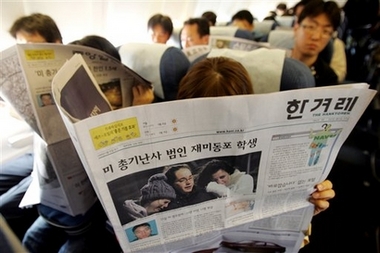Victims
Gunman's family had hard life in Korea
(AP)
Updated: 2007-04-18 12:58
 |
Large Medium Small |
SEOUL, South Korea - The family of the gunman in the Virginia Tech shootings had struggled while living in Korea, and emigrated to the US to seek a better life, a newspaper reported Wednesday.
 South Korean passengers in an airplane read newspaper reporting on the Virginia Tech shooting massacre in Blacksburg, Va., at the Kimpo Airport in Seoul, Wednesday, April 18, 2007. [AP]  |
"I didn't know what (Cho's father) did for a living. But they lived a poor life," Lim told the newspaper. "While emigrating, (Cho's father) said they were going to America because it is difficult to live here and that it's better to live in a place where he is unknown."
Police identified the shooter's father as Cho Seong-tae, 61.
Cho Seung-Hui, a 23-year-old senior majoring in English at Virginia Tech, arrived in the United States as boy in 1992. He was raised in suburban Washington, D.C., where his parents worked at a dry cleaners.
South Korean President Roh Moo-hyun held a special meeting with aides Wednesday to discuss the shooting, and was to speak publicly about the tragedy later in the day, his office said, without elaborating on what the president discussed with his aides.
The presidential Blue House issued a condolence statement Tuesday saying Roh "was shocked beyond description ... over the fact that the tragic incident was caused by a South Korean native who has permanent residency" in the US South Korean Foreign Minister Song Min-soon sent a letter to US Secretary of State Condoleezza Rice Tuesday night, expressing condolences and sympathy for the victims, the ministry said.
The case topped the front pages of nearly all South Korean newspapers Wednesday, which voiced worries that the shootings may trigger racial hatred in the US.
"We hope that this incident won't create discrimination and prejudice against people of South Korean or Asian origin," the Hankyoreh newspaper said in an editorial.
A sense of despair prevailed among the South Korean public.
"I'm too shameful that I'm a South Korean," an Internet user with the ID "iknijmik" wrote on the country's top Web portal site, Naver - among hundreds of messages on the issue. "As a South Korean, I feel apologetic to the Virginia Tech victims."
But some college students said the shooting was a case of an individual acting alone, and that Cho's South Korean heritage shouldn't matter.
"This is what an individual did wrong and nationality isn't important," said Park Joon-beom, a freshman at Seoul's Yonsei University. "I don't think South Koreans deserve blame."
"The shooting was shocking in itself, but the focus shouldn't be on that he is a South Korean," said Han Na-rae, a freshman at Yonsei. "I'm concerned that this may lead to racial discrimination against South Koreans and Asians."
Kim Min-kyung, a South Korean student at Virginia Tech reached by telephone from Seoul, said there were about 500 Koreans at the school, including Korean-Americans. She said South Korean students feared retaliation and were gathering in groups.
South Korean diplomats were traveling to the shooting site, said Foreign Ministry spokesman Cho Hee-yong.
Despite being technically in a state of war for decades against North Korea, South Korea is a country where citizens are banned from privately owning guns, and where no school shootings are known to have occurred.
However, it has not been immune from shooting rampages.
In 2005, a military conscript believed to be angered by taunts from senior officers killed eight fellow soldiers, throwing a grenade into a barracks where his comrades were sleeping and firing a hail of bullets.
| 分享按钮 |